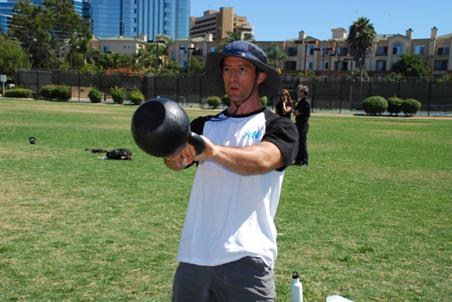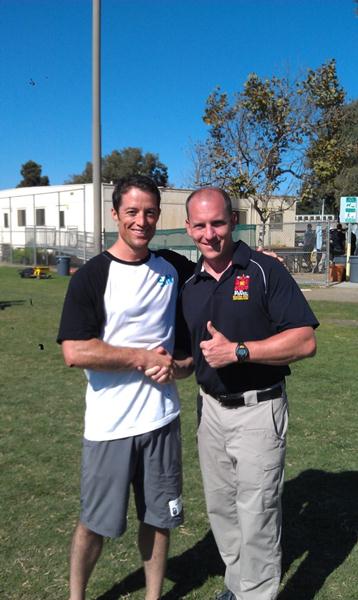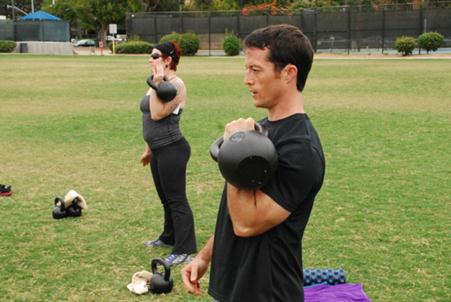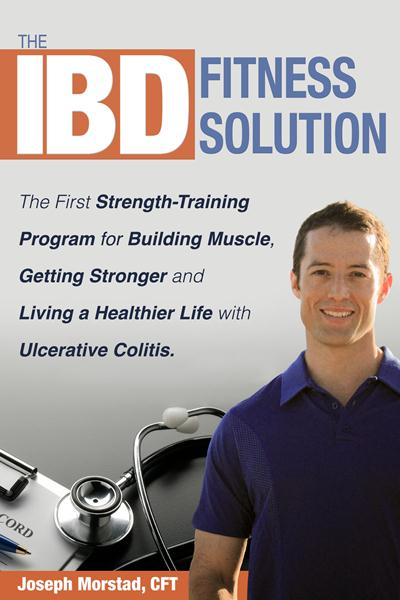Dragon Door Interviews Joseph Morstad, RKC
Interview by Adrienne Harvey, RKC II, CK-FMS, Primal Move Nat'l Instructor
April 19, 2013 05:30 AM

Dragon Door: How did you find kettlebells?
Joseph Morstad: I used to work out at 24 Hour Fitness, and while I was using a lacrosse ball on the wall behind my shoulder for myofascial release, a kid comes up to me and asks, "Do you know Max Shank? He's the only other guy I've seen do that exercise." At the time, I didn't know Max, so I Googled his name and found his gym in Encinitas. As a trainer who was trying to get into the fitness industry, I went to see if I could work at Max's gym. He wasn't hiring, but I ended up training with him and getting into kettlebells.
I trained with Max for a little bit, but had to stop after a while because I got sick and was diagnosed with inflammatory bowel disease (IBD). A year ago I decided to do the RKC, and realized that I needed some help with my training. So, I got back in touch with Max and started training again.
Dragon Door: How long have you been involved with the fitness industry?
Joseph Morstad: I first got certified with ISSA back in 2003. I did a little bit of training in the Bay Area before moving to New York City and working part time at a gym near where I lived. I eventually moved away from training others, but was always training myself. Then about four years ago, after recovering from IBD, I decided that training and helping people was what I needed to do.
Dragon Door: How did you train after recovering from IBD?
Joseph Morstad: With my IBD flare and hospital visit in January of this year, I was unable to eat, incredibly weak, and fatigued. When I came back, I started with parts of the Turkish get up. I'd start on my back rolling to pressing the kettlebell overhead. Core and glute exercises were very helpful. I just focused on basics to get moving again starting from the floor. Once I was able to build up enough strength to stand and move, I worked on Farmer's walks a lot. My goals at the beginning were to regain mobility, balance, coordination, and basic strength.
About five years ago, I was diagnosed with ulcerative colitis. Ulcerative colitis and Crohn’s disease are the two major forms of inflammatory bowel disease (IBD), a chronic auto-immune disease of the large intestine in which the lining of the colon becomes inflamed and develops tiny open sores. About 1.4 million people in the United States have IBD. Doctors believe that IBD is caused by a combination of genetics, the immune system, and environmental triggers. Currently there is no cure for ulcerative colitis or Crohn’s disease. The most recent time I was hospitalized, I lost 30 pounds. I was admitted the first week of January and stayed for five days.
It’s been interesting to learn more about IBD, and all the different medications. Now I know more about kettlebells, the way the body works, and how to strengthen everything. Because of this knowledge, my doctor has called my recent recovery remarkable. After losing 30 pounds in the beginning of January, I have been able to gain back all my lost weight! Plus I'm able to move and live normally again. Now I'm just trying to get my strength up to where it had been (and stronger). I really feel like kettlebells helped me regain my strength quickly and recover faster.

Dragon Door: How long does it usually take someone to recover from an IBD flare?
Joseph Morstad: I had some severe inflammation, and it depends on how the medication takes affect for each person. I was very lucky that the medication kicked in right away, but it can take several months depending on the individual. I have some friends who've been battling IBD flares for six to seven months, and even longer before the inflammation is under control. From there it may take even longer to regain lost weight and strength. I'm almost back to my normal weight, and I’m lucky to be back to full training sessions again. So, I’m fortunate to be able to say it has been a quicker recovery for sure.
Dragon Door: I read your book, the IBD Fitness Solution. When we spoke a few days ago you mentioned updating it now that you've become an RKC Instructor. What would you change?
Joseph Morstad: Since I understand more about kettlebell techniques and exercises like the get up, I can see more of their benefits. I really like the Turkish get up. Starting from the floor and just getting comfortable with one position before moving to the next can be beneficial for people recovering from IBD and anything which has robbed strength and challenged movement and body control.
At first, just the beginning of the get up could be the biggest strength exercise of the workout. Incorporating a glute bridge will help to regain abdominal strength and get the glutes to fire again. Something that would normally be a mobility or stability drill for most people can be a high-level strength exercise for someone coming back from an illness like IBD. But, the focus of regaining mobility and just moving the body again with kettlebells is really helpful and I need to add to my book. Being on my back for so long when I was sick made me incredibly weak and tight, especially around my calves and hips.
The Turkish get up has been something that’s been really helpful for both strength and mobility. Incorporating bracing techniques with the RKC plank has helped link my body together and restore my strength. The intestines are inflamed with IBD, which makes the whole abdomen feel weak. Being able to strengthen the abs, get the glutes to fire again, and finding the connected strength throughout the entire body again has been really helpful. It's something that I want to update, progress, and expand upon in my next book.
Dragon Door: I'd imagine regaining strength, mobility, and coordination could also help someone mentally recover from a flare.
Joseph Morstad: Definitely! It was a challenge because I take pride in the strength that kettlebell training helped me achieve. I like how awesome it feels to do a muscle up on the rings and how alive you feel when swinging a 48kg kettlebell. If you feel strong, it carries over to many other areas of your life. It was hard to go through an illness that caused me to lose 30lbs in a month. I felt like my body was gone, just getting up off the floor was a challenge. But even the first few times I was able to start working out again, I could actually feel the muscles working. They were sore in a good way, and that helped me feel like I was recovering and regaining control. I started to get my confidence back too. It didn’t matter that lifting a 12kg kettlebell felt heavy. I just made sure to keep progressing and was soon able to lift a 24kg bell.
Each training session helped mentally. When you can break it down and work on it on a day by day or even rep by rep basis, making it through these really small increments helps you get back to where you want to be. It's a really awesome feeling.
Dragon Door: What would be your advice for someone with IBD who’s interested in kettlebells?
Joseph Morstad: If you’re in the San Diego area, contact me through my website. Also, reading anything from the RKC library would be a good start. The methodology and ideas are great and have been very helpful for me. If they can find an RKC or HKC instructor in their local area, the personal connection is really helpful. Simply, get started! Begin with the basics of moving your body again. Work on improving your mobility and strength. Try something like kettlebell exercises and see how they work for you. Remember to strengthen your mind and practice seeing yourself living with strength, this carries over from your training into your daily life.
Passing the RKC in August showed me that I was strong. I really believe that experience stayed with me and helped me through my IBD recovery in January of this year.

Dragon Door: How did you prepare for your RKC?
Joseph Morstad: Training with Max and the guys at Ambition Athletics was huge. We would practice snatch technique a few times each week and I did a lot of 40kg single armed kettlebell swings. I got as strong as I've ever been in my life. It was funny because we practiced the snatch test a handful of times, and I never really did well with it at the gym. But on the actual test at the RKC, I passed. It really was more of a mental thing along with bringing up strength levels and using proper breathing during the snatch test.
Dragon Door: The snatch test can be very psychological, many people have had a similar experience.
Joseph Morstad: Exactly. And at the RKC, everyone is helping and cheering. On my first attempt, I did 40 snatches and dropped it while I was switching from hand to hand. That hadn't happened before, and I hadn't thought it was possible. Luckily I was able to test again and it all came together. I don’t really remember much of those five minutes—all the sudden I was in the 90s already and just finished it up. It was definitely a very, very cool moment in my life. Passing the test and being able to know that I did it was an awesome feeling.
Dragon Door: What’s your next goal?
Joseph Morstad: Lately, I’ve been researching a lot of areas involved with strength training, nutrition, psychology, mental focus, and how they relate to IBD and other auto-immune diseases. I want to put all that information into another book project. Personally, I want to get back to and beyond my original body weight and get stronger again. And I want to find some sort of challenge. Max Shank has had great success at the Highland Games and I’ve been thinking about trying it in San Diego this July. But, the big goal is continuing to get healthier and stronger. I’m looking forward to doing ring muscle ups again too.
Dragon Door: I'm sure your example is very inspiring to other people with IBD. Are you currently training people with those issues?
Joseph Morstad: I’m not training anyone with IBD in person right now but I’m helping some online who've bought my book. Getting others with IBD stronger is one of my goals and why I wrote my book, The IBD Fitness Solution. It's also why I want to complete this next project. I want everyone in the world with IBD to know that you can find strength again, and kettlebell exercises can help—that was one of the motivating factors to become an RKC. I want to show people that although you might have a disease like IBD, you can still be strong and do things that may seem impossible in the beginning.
I hope the fact that I came from having a hard time just getting up off of the ground to being able to pass the RKC is motivating for people. I hope it's served as an example. Sure I have these extra challenges, but strength is strength and the principles that work for a 200 pound athlete will work for a 130 pound person recovering from IBD.
That's my purpose now, to help people understand that they can actually train through this disease and provide solutions to help them regain their strength. Most of the training recommendations I found after I was initially diagnosed was to just go for walk, or really light exercises. I didn't want to do that because I knew I needed to get stronger. That's how I found the RKC and got to the point where I am now.

Back